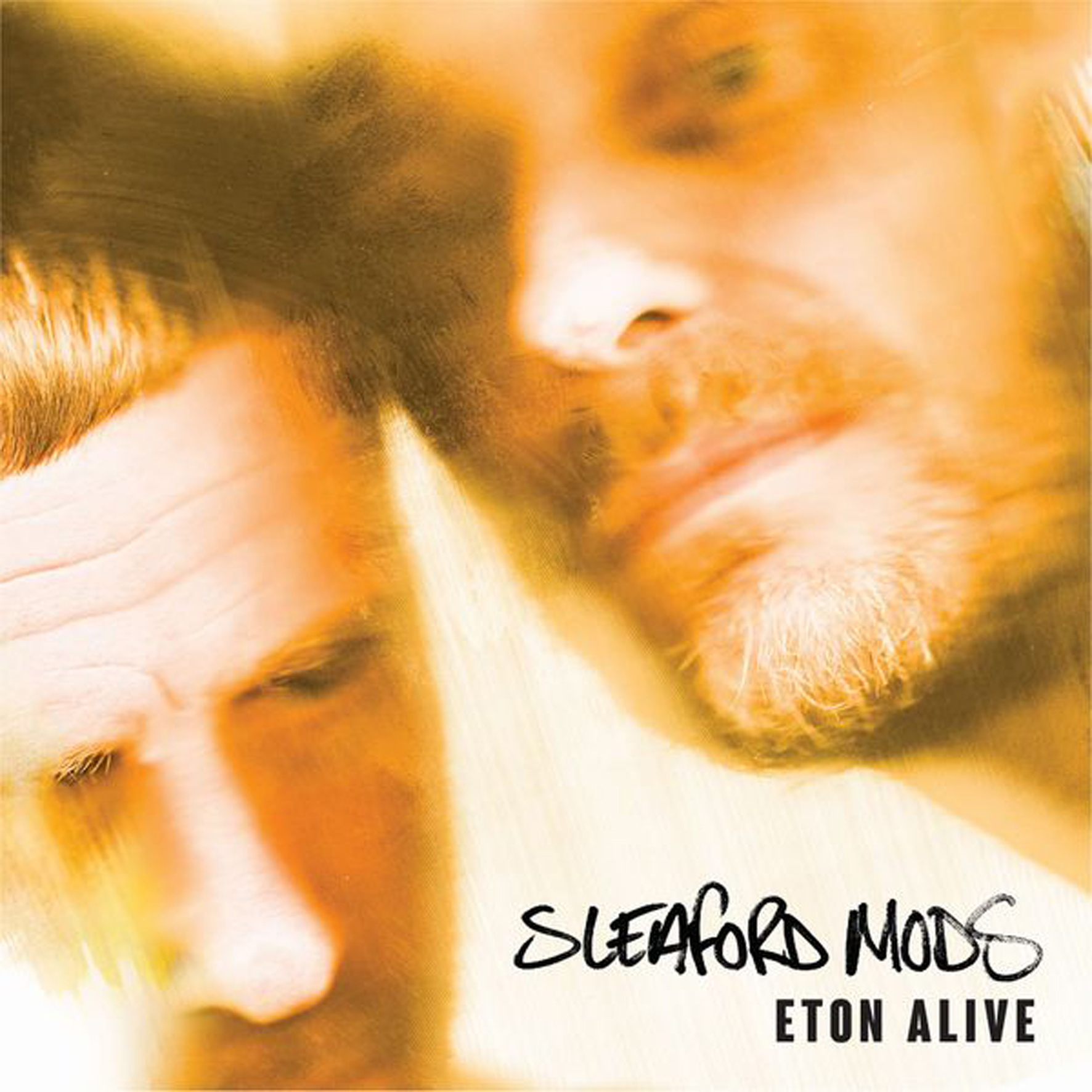Sleaford Mods, "Eton Alive"
 This prolific Nottingham-based duo are back with their fifth formal full-length and the first to be released on their own Extreme Eating imprint. Unsurprisingly, Eton Alive does not tamper much with the band’s signature backdrop of spare, simple grooves and Jason Williamson has no shortage of fresh topics that displease him. That consistency is a huge part of Sleaford Mods' charm though (along with Andrew Fearn’s eternally deadpan, head-bobbing presence, of course): sometimes the grooves are quite good and sometimes they are not, but they exist primarily as a platform for Williamson to unleash his vitriolic, heavily accented, and sometimes blackly funny stream-of-consciousness critiques of everything that rankles his sensibilities. Given the pair's continued hyper-constrained aesthetic and one-note approach to mood and melody, Eton Alive is a characteristically hit-or-miss affair, as everything depends the inspiration or impenetrability Williamson’s wordplay and how it fits with Fearn’s minimal, repetitive beats. That is to be expected though. During its strongest moments like "Top It Up," Eton Alive can be quite a bracing and invigorating reminder that Sleaford Mods are a singular bastion of integrity and spirited, free-floating hostility in a world that desperately needs both.
This prolific Nottingham-based duo are back with their fifth formal full-length and the first to be released on their own Extreme Eating imprint. Unsurprisingly, Eton Alive does not tamper much with the band’s signature backdrop of spare, simple grooves and Jason Williamson has no shortage of fresh topics that displease him. That consistency is a huge part of Sleaford Mods' charm though (along with Andrew Fearn’s eternally deadpan, head-bobbing presence, of course): sometimes the grooves are quite good and sometimes they are not, but they exist primarily as a platform for Williamson to unleash his vitriolic, heavily accented, and sometimes blackly funny stream-of-consciousness critiques of everything that rankles his sensibilities. Given the pair's continued hyper-constrained aesthetic and one-note approach to mood and melody, Eton Alive is a characteristically hit-or-miss affair, as everything depends the inspiration or impenetrability Williamson’s wordplay and how it fits with Fearn’s minimal, repetitive beats. That is to be expected though. During its strongest moments like "Top It Up," Eton Alive can be quite a bracing and invigorating reminder that Sleaford Mods are a singular bastion of integrity and spirited, free-floating hostility in a world that desperately needs both.
On its surface, the almost cartoonish simplicity of Sleaford Mods' music can seem quite ridiculous and infantile, particularly on the lead single "Kebab Spider," which feels like an amusingly wrong-headed mash-up of The Offspring and Tone Loc.Such dubious decisions are not exactly the wisest path to a great album, but they arguably serve a real purpose, balancing the bile of Williamson's motor-mouthed spoken-word with a healthy dose of dumb fun.Interestingly, Fearn's solo beat tapes as EXTNDDNTWRK show that he has plenty of inventive and nuanced ideas and the skill to execute them, but such experimental fare is almost entirely anathema to the Sleaford Mods aesthetic.In fact, it would not surprise me at all to learn that many of the beats Fearn brings to the project are intended solely to amuse and wrong-foot Williamson.Sometimes his more absurd curveballs work surprisingly well though, like the cell phone ringtone disco groove of "Discourse."More often, however, it is Fearn's legitimately great beats that yield the strongest songs.For example, "Negative Script" feels like a wonderfully squelching and sexy '90s hip-hop party jam.While the ratio between great beats and beats that fall somewhat flat is not entirely optimal, I find Fearn's overarching vision to be a legitimate stroke of outsider genius: at their best, Sleaford Mods do not feel like a band–they feel like someone just stepped onto my subway car, set down a boombox, and erupted into a scathing torrent of free-form poetry enlivened by some truly first-class swearing.
That is just one facet of another, larger stroke of genius that partially explains Sleaford Mods improbable ascent and deep relevance though.I am not going to foolishly pronounce punk dead, as there are always a handful of bands that miraculously manage to reanimate its weary carcass.However, endlessly rehashing the "three chords and a bad attitude" formula of the genre is a depressing and grotesque perversion of the original punk ethos.Similarly, very few people are clamoring for rap albums by middle-aged white men.Consequently, it is extremely hard for embittered forty-somethings to lash out at a stupid and corrupt world without looking ridiculous, as the prime window for being sneering and antisocial is when you are young, attractive, and stylish.The audience tends to dwindle precipitously as one ages into a grizzled and craggy crank, which is one of life's cruelest tragedies.Anyone that has suffered through an additional few decades of dashed dreams, bad jobs, and failed relationships likely has quite a bit of deep disillusionment and sad wisdom to share, yet has few options for artistically articulating their thoughts to the masses.
To their credit, Fearn and Williamson have found a perfect formula for making angry music by and for adults and it rightly resonates with people: no posturing, no pretensions, no frills, and an effortless disregard for genre tropes and trends–just a direct and very real connection to a charismatic working class malcontent with some colorful grievances to share over some minimal beats.On this album, the most striking manifestation of that connection is "Top It Up," as Williamson unleashes a frenetic and fiery rant over a backdrop of just a two-note bass line and a lurching drum shuffle.I truly have no idea what he is going on about most of the time, which is weirdly quite charming, as he is a basically a broken fire hydrant of British slang, eclectic allusions, imagined dialogue, surreal scenes, and apparent non sequiturs.Even after reading the damn lyrics to "Kebab Spider," I still have absolutely no idea what is happening, yet Williamson’s conviction and intensity almost make it all seem cryptically meaningful.
Curiously, there does seem to be some indication that Williamson is evolving a bit as a songwriter, as several of these pieces have snatches of almost-melody that act as a chorus of sorts.That is probably a solid instinct career longevity-wise, but it is still a work in progress, as melody is not a big factor in stand-out pieces like the throbbing creep of "Into The Payzone."If Eton Alive has a genuine weakness, it is merely that there just are not enough solid songs to amount to a great album, but Sleaford Mods have always been far more of a singles band anyway.That is hardly news.However, I am also reminded of a throw-away line from the documentary A Bunch of Kunst, where someone from Williamson's circle observes that the project has transformed from a mirror on Williamson himself to a mirror on society.That makes sense, as Williamson’s world has transformed quite a bit since Sleaford Mods' early years: he is no longer a cranky nihilist with a miserable factory job–he is a successful musician dealing with tours, press, and record labels.As such, much of his bile is focused on the shallowness, fakery, and disposability of the culture industry these days.Those are deserving targets to be sure, but for me, those songs do not hit on quite the same deep, existential level as his hilariously bitter tales of desperation like "Jobseeker."Of course, expecting Williamson to still pretend he is that same person would be to fundamentally misunderstand the honesty and realness of this band.Still, I cannot help it if I relate more strongly to Williamson's downtrodden and embittered everyman phase: whether celebrities are fake or not has no bearing on my life at all.Fortunately, Williamson remains the sort of guy who could deliver an impassioned and scathingly funny reading of a phone book if he put his mind to it, so I do not see myself looking away anytime soon.
 



